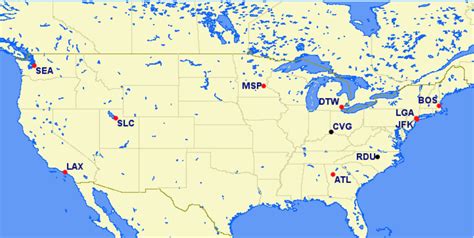
Delta Air Lines is reportedly planning significant overhauls at several of its major hubs, including Atlanta, Los Angeles, and New York-LaGuardia, according to internal documents leaked to View From The Wing. The proposed changes aim to enhance operational efficiency, improve the passenger experience, and better position the airline for future growth, though details remain subject to change and official confirmation from Delta.
Delta Air Lines, one of the world’s largest airlines, is reportedly poised to implement extensive renovations and strategic adjustments across its key hub airports. Internal documents, purportedly leaked and obtained by the industry blog View From The Wing, reveal comprehensive plans targeting improvements in operational efficiency, passenger comfort, and long-term competitive positioning. These potential changes, affecting hubs such as Atlanta (ATL), Los Angeles (LAX), and New York-LaGuardia (LGA), are designed to streamline operations, enhance the customer experience, and accommodate future growth, though the plans are preliminary and subject to change.
The leaked documents detail potential infrastructure upgrades, technology implementations, and service enhancements aimed at optimizing airport operations and passenger flow. While Delta Air Lines has yet to officially confirm these plans, the reports suggest a substantial investment in modernizing and expanding its hub facilities to meet evolving market demands and maintain its competitive edge in the aviation industry.
Atlanta (ATL): Enhancing Operational Efficiency and Passenger Experience
Hartsfield-Jackson Atlanta International Airport (ATL), Delta’s primary hub, is expected to undergo significant changes centered on improving gate utilization, reducing taxi times, and enhancing the overall passenger experience. The leaked documents indicate plans to reconfigure gate assignments to optimize aircraft flow and minimize delays. This reconfiguration may involve relocating certain flights to different concourses or gates to reduce congestion and improve on-time performance.
According to the leaked documents, Delta is considering implementing advanced technologies to streamline ground operations at ATL. This could include the deployment of automated aircraft tracking systems, predictive maintenance tools, and enhanced communication networks for ground crews. These technologies aim to improve real-time decision-making and optimize resource allocation, leading to more efficient turnaround times and reduced operational disruptions.
Passenger experience enhancements at ATL may include upgrades to existing facilities, such as expanded seating areas, improved Wi-Fi connectivity, and additional charging stations. Delta is also reportedly considering the introduction of new amenities, such as enhanced food and beverage options, expanded retail offerings, and dedicated customer service centers. These improvements are designed to create a more comfortable and convenient travel experience for passengers transiting through ATL.
Los Angeles (LAX): Modernizing Facilities and Expanding Capacity
Los Angeles International Airport (LAX) is another key hub targeted for significant investment. The leaked documents suggest that Delta is planning to modernize its facilities at LAX and expand its capacity to accommodate future growth. This may involve the construction of new gates, the renovation of existing terminals, and the expansion of baggage handling systems.
Delta has already made substantial investments in LAX in recent years, including the opening of a new Sky Way at Terminal 3 and a dedicated Delta One check-in area. The leaked documents indicate that the airline plans to build on these investments by further enhancing its facilities and services at LAX. This could include the introduction of biometric screening technology, the expansion of premium lounge facilities, and the addition of new retail and dining options.
The expansion of capacity at LAX is particularly important for Delta, as the airline seeks to capitalize on the growing demand for air travel to and from the West Coast. By increasing its presence at LAX, Delta aims to strengthen its competitive position in the region and attract more business and leisure travelers.
New York-LaGuardia (LGA): Optimizing Operations and Enhancing Connectivity
New York-LaGuardia Airport (LGA) is undergoing a major redevelopment project, and Delta is actively involved in shaping the future of its operations at the airport. The leaked documents suggest that Delta is focused on optimizing its operations at LGA and enhancing connectivity with other destinations. This may involve reconfiguring gate assignments, improving baggage handling processes, and expanding its network of flights to and from LGA.
Delta has already invested heavily in the redevelopment of LGA, including the construction of a new terminal that offers state-of-the-art amenities and a more efficient passenger experience. The leaked documents indicate that the airline plans to continue investing in LGA to further enhance its operations and improve its competitive position. This could include the introduction of new technologies, the expansion of its premium services, and the addition of new routes to key destinations.
The optimization of operations at LGA is particularly important for Delta, as the airport is known for its limited space and frequent delays. By streamlining its operations and improving its infrastructure, Delta aims to reduce congestion and improve on-time performance at LGA. This will not only benefit passengers but also enhance the airline’s overall efficiency and profitability.
Strategic Implications and Competitive Landscape
Delta’s reported hub overhaul plans have significant implications for the airline industry. By investing in its key hub airports, Delta aims to strengthen its competitive position, improve its operational efficiency, and enhance the passenger experience. These investments will help Delta attract and retain customers, increase its market share, and generate long-term value for its shareholders.
The hub overhaul plans also reflect Delta’s broader strategic vision. The airline is focused on building a strong global network, offering a premium customer experience, and leveraging technology to drive innovation and efficiency. By investing in its hub airports, Delta is laying the foundation for future growth and success.
Delta’s competitors, including American Airlines, United Airlines, and Southwest Airlines, are also investing in their hub airports to improve their operations and enhance their competitive positions. The airline industry is highly competitive, and airlines are constantly seeking ways to differentiate themselves and attract customers. By investing in its hub airports, Delta is signaling its commitment to providing a superior travel experience and maintaining its leadership position in the industry.
Challenges and Considerations
While Delta’s hub overhaul plans offer significant potential benefits, they also present several challenges and considerations. One challenge is the cost of the projects, which could be substantial. Delta will need to carefully manage its investments and ensure that the projects deliver a strong return on investment.
Another challenge is the potential for disruption during the construction and renovation phases. Airport construction projects can be complex and disruptive, and they can lead to delays, congestion, and other operational issues. Delta will need to work closely with airport authorities and other stakeholders to minimize these disruptions and ensure that the projects are completed on time and within budget.
Additionally, Delta will need to consider the impact of the hub overhaul plans on its employees. The projects could lead to changes in job roles and responsibilities, and Delta will need to provide its employees with the necessary training and support to adapt to these changes. The airline will also need to communicate effectively with its employees and address any concerns they may have.
Industry Analyst Perspectives
Industry analysts have offered various perspectives on Delta’s reported hub overhaul plans. Some analysts believe that the investments are a smart move that will help Delta strengthen its competitive position and improve its operational efficiency. Other analysts are more cautious, noting the potential challenges and risks associated with the projects.
One analyst from Cowen & Company noted that “Delta has a history of making smart investments in its infrastructure and technology. These hub overhaul plans are consistent with that strategy, and they should help Delta maintain its competitive advantage.”
Another analyst from Raymond James stated that “While the potential benefits of the hub overhaul plans are clear, there are also significant risks. The projects could be delayed or over budget, and they could lead to disruptions that negatively impact Delta’s operations.”
Overall, industry analysts agree that Delta’s hub overhaul plans are a significant development that could have a major impact on the airline industry. The success of the projects will depend on Delta’s ability to manage the challenges and risks effectively and deliver the promised benefits.
The Future of Air Travel and Airport Infrastructure
Delta’s hub overhaul plans reflect a broader trend in the aviation industry towards investing in airport infrastructure and enhancing the passenger experience. As air travel continues to grow, airports are facing increasing pressure to accommodate more passengers and flights. This is leading to increased investment in airport infrastructure, including new terminals, expanded runways, and improved baggage handling systems.
Airlines are also investing in technology to improve the passenger experience. This includes the deployment of biometric screening technology, mobile check-in apps, and personalized entertainment systems. These technologies are designed to make air travel more convenient, efficient, and enjoyable for passengers.
The future of air travel will likely be characterized by increased automation, personalization, and connectivity. Airports will become more integrated with airlines’ operations, and passengers will have more control over their travel experience. The investments that Delta and other airlines are making in airport infrastructure and technology are laying the foundation for this future.
Delta’s Commitment to Sustainability
In addition to improving operational efficiency and enhancing the passenger experience, Delta is also committed to sustainability. The airline has set ambitious goals for reducing its carbon footprint and minimizing its environmental impact.
Delta is investing in new aircraft that are more fuel-efficient, and it is working to improve its operational practices to reduce fuel consumption. The airline is also investing in sustainable aviation fuels (SAF), which are made from renewable sources and can significantly reduce carbon emissions.
Delta’s commitment to sustainability extends to its hub airport operations. The airline is working to reduce waste, conserve water, and use renewable energy sources at its airport facilities. Delta is also partnering with airport authorities and other stakeholders to promote sustainable practices throughout the aviation industry.
Delta’s hub overhaul plans reflect its commitment to sustainability. The airline is incorporating sustainable design principles into its new facilities and is working to reduce the environmental impact of its operations. By investing in sustainability, Delta is helping to protect the environment and create a more sustainable future for air travel.
Community Impact and Economic Benefits
Delta’s hub overhaul plans are expected to have a significant positive impact on the communities surrounding its hub airports. The projects will create jobs, generate economic activity, and improve the overall quality of life for residents.
The construction and renovation phases of the projects will create thousands of jobs for construction workers, engineers, and other skilled professionals. The expanded airport facilities will also create new jobs in the aviation industry, including pilots, flight attendants, ground crew, and customer service representatives.
The economic activity generated by the projects will benefit local businesses, including restaurants, hotels, and retail stores. The improved airport facilities will also attract more visitors to the area, which will further boost the local economy.
Delta is committed to working with local communities to ensure that the benefits of the hub overhaul plans are shared equitably. The airline is partnering with community organizations to provide job training and apprenticeship opportunities for local residents. Delta is also investing in community development projects to improve the quality of life for residents.
Conclusion
Delta Air Lines’ reported plans for significant overhauls at its major hubs, including Atlanta, Los Angeles, and New York-LaGuardia, underscore the airline’s commitment to enhancing operational efficiency, improving the passenger experience, and positioning itself for future growth. While the plans remain subject to change and official confirmation, the leaked documents provide a glimpse into Delta’s strategic vision for its key hub airports. The investments in infrastructure, technology, and service enhancements are expected to have a significant impact on the airline industry, the communities surrounding the airports, and the future of air travel. As Delta navigates the challenges and opportunities associated with these projects, its success will depend on its ability to manage costs, minimize disruptions, and deliver the promised benefits to its customers, employees, and shareholders. The coming years will be crucial in determining the extent to which these ambitious plans transform Delta’s hub operations and contribute to its long-term success in the highly competitive aviation market.
Frequently Asked Questions (FAQ)
1. What are the main hubs that Delta Air Lines is planning to overhaul?
According to leaked internal documents, Delta is planning significant overhauls at three of its major hubs: Atlanta (ATL), Los Angeles (LAX), and New York-LaGuardia (LGA). These renovations are aimed at improving operational efficiency, enhancing the passenger experience, and positioning the airline for future growth.
2. What are the key improvements expected at Hartsfield-Jackson Atlanta International Airport (ATL)?
The plans for ATL focus on improving gate utilization, reducing taxi times, and enhancing the overall passenger experience. This may include reconfiguring gate assignments to optimize aircraft flow, implementing advanced technologies for ground operations, and upgrading passenger facilities with expanded seating areas, improved Wi-Fi, and new amenities.
3. What type of investments is Delta making at Los Angeles International Airport (LAX)?
At LAX, Delta is planning to modernize its facilities and expand its capacity to accommodate future growth. This could involve the construction of new gates, the renovation of existing terminals, and the expansion of baggage handling systems. Delta has already invested in a new Sky Way at Terminal 3 and a dedicated Delta One check-in area.
4. How is Delta Air Lines improving operations at New York-LaGuardia Airport (LGA)?
Delta is focused on optimizing its operations at LGA and enhancing connectivity with other destinations. This may involve reconfiguring gate assignments, improving baggage handling processes, and expanding its network of flights to and from LGA. Delta has already invested in the construction of a new terminal at LGA.
5. What are the potential challenges associated with Delta’s hub overhaul plans?
The hub overhaul plans present several challenges, including the high cost of the projects, the potential for disruption during construction and renovation, and the need to manage the impact on Delta’s employees. Effective management of these challenges is crucial to ensure the projects are completed on time, within budget, and with minimal disruption to operations and passenger experience.









